
 |

|
|
|
|
Marriage (Feb 7. 1924 - 1956, his death): (1) Catherine F. Weber (May 5. 1900 - 1963) Children: Agnes F. (Oct 15. 1924 - 2000), Edward B. (Nov 3. 1928 - Mar 30. 2000), Frances Maria (1937 - Oct 14. 1943), Thomas/Bruce (1940 - ). |
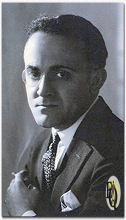 |
|
Above right: Collection Billy Rose Theatre
Division, The New York Public Library. Ed Latimer. |
|
|
Edward Bancroft Latimer was born on February 14. 1897 in Philadelphia, Pennsylvania to Daniel B. Latimer (b. Aug 12. 1866 d. Mar 21. 1924), a salesman and Bertha M. Hayney (b. Aug 12. 1869 - d. Oct 20. 1929) A student of psychology in Philadelphia, a Master of Arts Mr. Latimer had some very practical ideas about "audience psychology", a subject in which he was intensely interested and one with which he said every actor should be familiar. He considered the study and practice of "character" makeup's a delight, and spent much time on it when necessary. "The Aeschylean Players", a Tioga N.J. organization much lauded for its excellent stage performances, performed the comedy Polly In Politics. Edward B. Latimer not only participated but was the club's president (1914 - 1915). The company usually played at events where proceeds went to charity. |
|
| The Stage Society Players, Philadelphia | |
| "The Stage Society Players" were: Thomas McKean, S. Uytendale Baird, Dorothy E. Shelmerdine, Marie Baer, Eileen W. Du Bois, Margaret Cooper, Dorothy Chertax, James L. Pequignot, Henry L. Fox, Earle C. Rice, Everett Bell, Harold J. Harbinson, Frances P. Dade, Mabel Sheppard, Sophia Farr Geddes, Katherine Kennedy, Helena Balbirnie, Vinton Freedley, Charles D. Mitchell, Henry C. Sheppard, William H. Whitney, William A.S. Lapetina, Geo. C. Crout, Eva Tingey, Anna Plummer, Violet E. Ross, Clairborne Mitchell, Mabel Shepard, C.F. Horne, Margaret O'Neill, Cadette Dalsimer, Jay Frank, Fanny Albertman, Marguerite Papolcy and Edward B. Latimer. | |
|
He began his real theatrical climb with his first professional engagement at "The Little Theater of Philadelphia" with "The Stage Society Players" under the direction of Mrs. Beulah E. Jay in a repertoire of G.B. Shaw, Galsworthy, Chekov, Ibsen, .... To add to his income Ed took on a daytime job. The two jobs dovetailed neatly in an A to Z pattern. At night in the theatre he played roles ranging from juveniles to aged, bearded grandfathers; during the day he completed the A to Z pattern—working as a typist. Latimer would stay there for two years. There is no reason to think he would miss any of their performances. If more than one play was performed on a single evening, then a choice among the stock actors was made. Here are his performances which we can confirm with certainty:
Altruism (Karl Ettlinger) (Jan 28. 1916, as
a Parisian), |
|
| B. F. Keith's Theatre, Philadelphia | |
|
Some of the performances caught the eye of the renowned B.F. Keith circuit and subsequently were contracted for performances in "B. F. Keith's (New) Theatre" in Philadephia: The comedy playlet "The Late Lamented" (Keith's, Jul 2. 1917) with William Whitney and Henry L. Fox in the lead, also had other "Stage Society Players" as the supporting cast in this vaudeville act: Frances Lee, Violet E. Ross, Fanny Albertman and Edward B. Latimer. Edward B. Latimer made, what was described as "his vaudeville debut" with Marie Baer the novel playlet The Lingerie Laureate (Lee Pape) (Jul 8. 1917). Earlier the sketch had been the comedy hit of the Stage Society's season. |
|
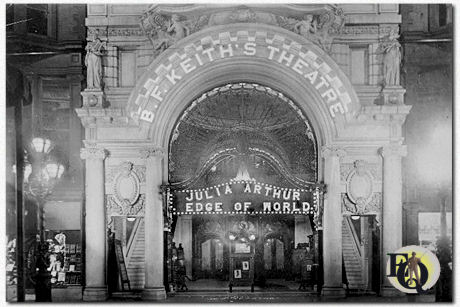 Above: The entrance of B. F. Keith's (New) Theatre in Philadelphia in 1917, owned by the renowned B.F. Keith circuit. |
|
| On the Road | |
|
With a good foundation secure after two years in the city of his birth, Lewis & Gordon engaged him for one of their acts, which played the Orpheum Circuit an entire season (1917 - 1918). So he made his first trip "on the road" in a one-act play on the Orpheum Circuit, traveling from Philadelphia to the West Coast. The first anniversary of the opening of Fay's Theatre (aka Fays Theatre, Providence, R.I.) under the management of Edward M. Fay was inaugurated November 19. 1917 with capacity audiences witnessing a program of vaudeville and feature photoplays. Marcel Delancourt, Edward B. Latimer, Margaret Lee, Hazel Webb, and Edward Brady were seen in a very timely and patriotic act, entitled Between Love and Duty. While on the Coast Mr. Latimer played with Mae Murray in de theater version of Danger, Go Slow (early 1919), directed by Robert Leonard. The next season came a transcontinental tour in Frank Wilcox's presentation of It Pays To Advertise, in which he enacted Ambrose Peale (1919 - 1920). |
|
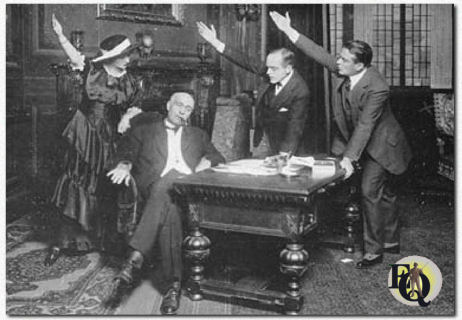 Above: Publicity photographs, like this one for It Pays to Advertise, usually relied on pictures from professional productions, often from New York, and gave Circuit audiences little indication of what the production they would see actually looked like. Iowa. Ed Latimer is possibly the second from the right. |
|
|
Then followed more stock, with "The Mae Desmond Players", Philadelphia; "The Majestic Players", London, Canada; Summer stock in Hamilton, Ontario, Canada with "The William Grew Players" at the Grand Opera House in Civilian Clothes (May 1921). He also did spend time to be the deputy of the 100 per cent Equity company in Lynn, Mass. A tour thru the Dominion in Charley's Aunt. In May 1921 he became a member of labor union representing American Actors and Stage Managers in the theatre called the Actors' Equity Association (Chicago office). |
|
| The Frances McGrath Resident Players, Paterson, N.J. | |
| "The Frances McGrath Resident Players" were: Frances McGrath, Forrest Orr, Harry Fisher, Alden P. Ricks, Rita Davis, Grace Fox, William Melville, Connie Roe, Cecily McShane, Russell Webster, William Web, Donald Gregory, Gladys Reardon, Harold Jessup, Hal Crane, Edna Marshall, George Dill, Ann Browning, George V. Dill, and Edward Latimer. | |
| For one season (Sep 1921 - Mar 1922) Edward joined "The Frances McGrath Resident Players" at the Lyceum Theatre in Paterson, N.J. which presented comedies* such as Turn to the Right, Cappy Ricks, The Brat, Fair and Warmer, Broadway and Buttermilk, Ten Nights in a Barroom, The Divorce Question, Dawn O' the Mountains, The Man from Home, The Naughty Wife, Jerry, and Getting Gertie's Garter. | |
| The Permanent Players, Winnipeg, Canada | |
| "The Permanent Players" were: George Earle (who also directed), Emily Smiley, John Winthrop, Jack McClellan, Lynda Earle, George Earle, Edna Earl Andrews, Gordon Mitchell, Arthur R. Edwards, Belva Morrell, Dick Mack, George Secord, and Edward Latimer. | |
| This led to his engagement with "The Permanent Players", Winnipeg, Canada. When they opened the Season on August 7. 1922 he reportedly quickly won a place in the hearts of all. In the first week of September the play Thelma did capacity. Friday the Thirteenth was the New Year week's (Jan 1923) offering where Edward Latimer fitted in and out a necessary part to the denouement of this mystery drama. For their 35th week at the Winnipeg Theater, "The Permanent Players" presented It's a Boy ( April 9. 1923). In May 1923 he announced he expected to go on the road with a New York company. | |
| John B. Mack Century Players, Lynn, Mass. | |
|
"The John B. Mack Century Players"
were: John B. Mack (who also directed), Wilmer Walter, Miami Campbell,
David Baker, Priscilla Knowles, Lorna Carroll, Ida Moulton, Ben Hadfield,
A. Guy Caldwell, Ida Moulton, Howard Miller, Irene Homer, Bertram Perry,
Fred Harvey, Charles Franklyn, Joseph Lee, Isabel Ross Owen, Louis
Wolford (who also assisted in directing, and was stage manager),
Margaret S. MacArthur, Phyllis Connard, Harold Hutchison, Anna Powers,
Edwin H. Kasper, Anna Layng, Wilmer Walter, Orris Holland, Olive Meehan,
Ackland Powell, Adele Sinclair, Eugene Head, Virginia Richmond, and
Edward Latimer. John A. Thompson was scenic artist, George E. Clark was the business manager, Hazel M. Ball was treasurer, Mr. Castilla technical director. |
|
|
He then signed a five-year contract with the "Century Players" van de John B. Mack Co. of Lynn, Mass. (ca 1923) who performed at Auditorium Theatre, Malden, Mass. On December 19. 1923, Edward appeared as a clerk in their performance of Driftwood (Owen Davis), only to bring a mammoth production of The Roundup the following week during the Christmas season. On February 7. 1924 Ed married Catherine Weber, a secretary, in the St. Pauls Cathedral in Boston. Shortly thereafter he was on stage with the "Century Players" in The Cat and the Canary (Feb 11. 1924) , the following week a much praised version of The Merchant of Venice (Mar 5. 1924) followed with Ed doing "very well" in the role of Gratiano. On March 29. 1924 Edward Latimer "of The Century Players" was described as not only an able actor but also a well-read journalist, who had contributed to the trade journal The Billboard and other publications, including the breezy little house program of the Auditorium Theater, Lynn, Mass. When the "Century Players" brought Alias Nora O'Brien (Apr 2. 1924) Edward was cast as Henry Ruggs. On June 7. 1924 The Billboard reported that Ed garnered fresh laurels on their closing week as Karl Pfeiffer in Friendly Enemies. The same was applicable in his portrayal of Isidore Solomon in Welcome Stranger. "Verily this young actor is making rapid strides toward a Broadway production if the local newspaper reviews are any criterion of his work." In August 1924 Paul Scott was signing up a cast for the John B. Mack "Century Players", Lynn, Mass. that included Edward Latimer. Mr. Scott also signed people for other companies. Edward who was with a summer stock company engaged by Paul Scott for the Goldstein Bros. at the Mountain Park Casino, Holyoke, Mass., and who was to return to the John Mack Company, also joined the cast of the "Park Players", Manchester, New Hampshire (Aug 9. 1924). Edward and Catherine's first child, Agnes F. , was born on October 15. 1924 in Westfield, New Jersey. The "Stanley James Players" at the Opera House, were in their ninth week in Lowell, Mass. (Nov. 10 1924) with Edward Latimer among the excellent cast. They stayed 35 weeks then "The Stanley James Players" opened (Jun 1. 1925) at The Orpheum, Montreal with the comedy The Best People (Avery Hopwood & David Gray). The Whole Town's Talking (Loos & Emerson) was a play presented at the Orpheum (Montreal, June 22. 1925). Ed Latimer not only did the bulk of the evening's work, but did it well, although he pitched his portrayal rather high. When on September 7. 1925 "The Century Players" reopened their regular season of stock at the Auditorium Theater in Massachusetts several actors had been working elsewhere all summer. Wilmer Walter and Edward Latimer returning from Montreal. Amateur players representing dramatic groups in seven North Texas cities united, in the presentation of the Nugent comedy, Kempy in two performances at the Little Theater of Gainesville, Tex. “Ed Latimer, Jr., in a character role, was well made up, but his voice showed the strain of imitation of an elderly man" (Gainesville, Tx, May 14. 1926). On November 19. 1927 The Billboard reported Ed Latimer, as strong favorite in Lynn, appearing as guest star with the John B. Mack Players (Auditorium, Salem, Mass.) Edward's second child, Edward B. Latimer Jr. , was born on November 3. 1928 in Massachusetts. |
|
| From Burlesque to Broadway... | |
|
In 1930 he was taking leads in musical stock companies in the burlesque and regular circuit in New York. Dave Kraus, operator of the Fox-Jamaica Theater, Mutual Circuit burlesque house changed the policy of the house (Apr 5. 1930). Kraus had organized a musical stock tab. company for the presentation of Not Tonight, Dearie, for the opening week, with Go Easy Mabel; My Lady Friends and similar plays to follow. John B. Mack staged the plays and Ed Latimer joined the cast led by Paul Donah. If profitable the concept was to be adopted on the Mutual Burlesque Circuit, thereby sing the swan song of circuit burlesque... "The Harvey Players" at the Hippodrome Theater, Baltimore under the direction of Charles Phipps brought the three-act farce Bedfellows (Dec 6. 1930), with Ed Latimer and Gladyce Harvey in the leads. In August 1932 he also appeared as Sloppy in a Broadway play called The Devil's Little Game (Provincetown Playhouse, Aug 1. 1932). Edward B. Latimer became the director at St. Mary's Auditorium in Plainfield, N.J., during the 12th season of performances by the "Players Club." On December 30. 1932, he directed the comedy Nothing but the Truth (by James Montgomery). Thanks to his direction, the play maintained a fast and funny pace from beginning to end. He continued directing when the "Players Club" staged the three-act comedy Lombardi, LTD (Frederic and Fanny Hatton) on April 28. 1933. |
|
| The Binghamton Repertory Theatre, Binghamton, NY | |
| In April 1936 Edward was chosen to replace Charles Schofield as company director at "The Binghamton Repertory Theatre". Among the credits mentioned were roles in Street Scene and Abraham Lincoln. Following a season in London & Winnipeg, Canada, and Salem and Lowell, Mass. he spent two years with the southern company of Abie Irish Rose***. Then signed his 5 year contract for the "Century Players". Latimer established and developed a Little Theatre movement in Elizabeth and Plainfield, N.J. He has acted with "The New York Civic Repertory Co." and "The Theatre Guild" and was at one time associated with Jasper Deeter, founder of the Hedgerow Theatre in Philadelphia. He kept this function at least until 1938. | |
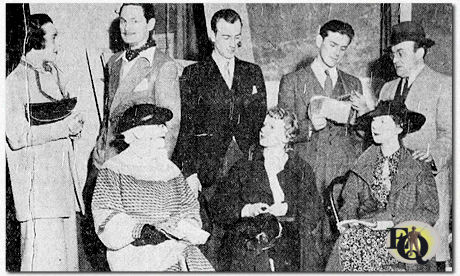 Above: The professional company of the "Binghamton Repertory Theatre", scanning their lines for the last time before the first performance of When Ladies Meet (Rachel Crothers) at the Masonic temple (May 14. 1936). Left to right, front row: Gertrude Bondhill, Virginia Stevens, Jean Arden. Back row: Dorothy Kennedy, John Vosburgh, Donn Bennett, Warren Douglas and Edward B. Latimer, the director. |
|
|
They started the season on May 14. 1936 with a performance of When Ladies Meet (Rachel Crothers) followed the next week by Another Language. Edward B. Latimer didn't only direct, he did an excellent job as the intoxicated Justice of the peace, Egbert Busty in the comedy Unexpected Husband (Jun 23. 1936) by the "Repertory Players" at the Masonic Temple Theatre, Binghamton. |
|
| Radio start (WJZ and WHN) | |
|
Ed Latimer, at some point, became program director of WBNF radio in Binghamton. Radio, the new medium, began its rise and appealed fully to the talents found in theater, stock, and vaudeville. By specializing in straights, heavies, accents, and storytelling, a fine career in radio for Latimer began in 1936. As he had done in theater, here he also started off by combining the roles of directing and acting. The first radio broadcasts with Ed Latimer we can confirm are found late in 1936. Boxer James Braddock then (WJZ, Dec. 9. 1936) became an actor in his own series. It told his story that brought Braddock out of Hell's Kitchen to the prize ring. Edward B. Latimer was part of the cast of James Braddock. It is unknown how long the series lasted. Around this period (1937) Catherine and Edward were blessed with a third child: Frances Maria. WHN was one of the first radio stations in New York City. Back in 1928 it was bought by the Loew's Theatre Organization (actually Marcus Loew Booking Agency) which engages in booking, management, direction, and operation of theatres through the United States. The Radio Almanac (for New Yorkers) (WHN, Apr 5. 1937) for the WPA Federal Theatre Radio Division was a lively well-written, look at the events in New York with Ed Latimer. It included a dramatization of how writer Irvin S. Cobb got his first newspaper job in New York. (WPA=Work Projects Administration, originally Work Progress Administration) In 1937 Ed Latimer directed the WPA Federal Theater Radio Division's oldest series, Pioneers of Science then in its second year over WHN. His first show "The Life of Galileo" was heard on October 7. 1937. Several shows followed in which Edward played the title role. For Men of Art he played the title role in ""Mark Twain - Clown by Request" (T.O. Day) (WHN, Sep 20. 1937). In November, he also directed episodes of Men of Art (WHN, Nov 1937). |
|
| Radio continues (CBS, NBC, ...) | |
|
He starred in the lead role in the drama Tish (CBS, Oct 14. 1937 - Feb 28. 1938). Americans at Work (CBS, May 4. 1938) the first of the weekly series sponsored by the CBS Adult Education Board was a combined dramatization, narration and interview dealing with sandhogs** which featured Frank Gallup, Dean Carleton, Carl Franck, Arnold Moss, Edward Latimer,...
Wings for the Martins
(NBC-Blue, 1938 - 1939) produced by the
Office of Education, National Congress of Parents and Teachers, it
dramatized social problems involved |
|
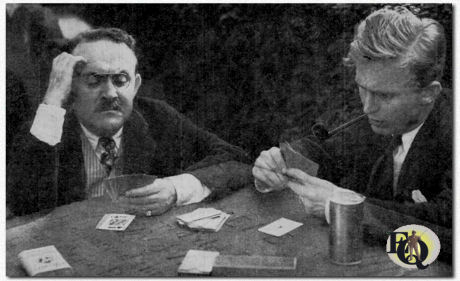 Above: The Ghost of Benjamin Sweet (CBS, 1938) with Karl Swenson (a spinoff from The Columbia workshop episode Jan 8. 1938). Every broadcast was a complete story. Some characters were on every program, however - among them Ben's ghost (right) played by Karl Swenson, and one of his friends, the ghost of Theobald Tubbs, played by Ed Latimer. They are friendly spooks - Robin Hoods of the Other World, working with their supernatural powers (Sep 1938). |
|
|
Between 1938-40 he already had an impressive list of radio shows in which he had appeared:
Mrs. Wiggs of the Cabbage Patch
(NBC, 1938), Sometime in 1940, our couple also had their fourth child Thomas/Bruce. Initially in Home of the Brave (CBS- NBC, Jan 6. - Sep 19. 1941) radio's "tender story of gallant people", Latimer played Doc Gordon, when in September Tom Tully left the series, Ed took over the role of Joe Meade opposite Casino (Sammie Hill). (Picture below left) |
|
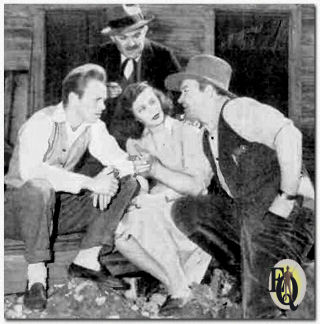 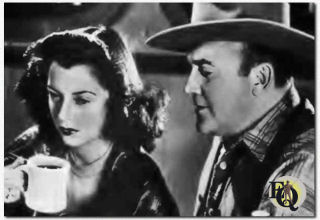 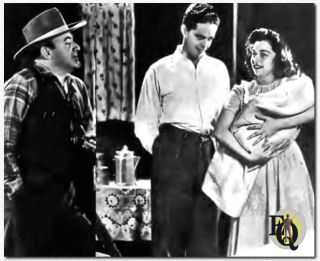 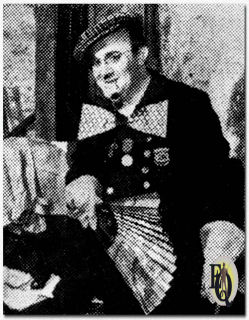 Top left: Home of the Brave (NBC, Jun 1941) Before a Decrepit - New Chance building, Neil Davisson (Richard Widmark), wife Lois (Jone Allison), Doc Gordon (Ed Latimer) and Joe Mead (Tom Tully) in the rear discuss Casino's strange behavior. Joe found her on a San Francisco wharf. Top right: Home of the Brave (NBC Red, Sep 1941) radio's tender story of gallant people. Kindness was something Casino (Sammie Hill) had never known until she met Joe Meade (Ed Latimer), who said, "There's lots of folks in the world that need a new chance." Above left: She smiled, and Joe (Ed Latimer) was reminded of the startling loveliness of dawn light on a distant peak. Casino (Sammie Hill) was becoming a woman. Above right: For Auld Lang Syne, Ed Latimer heard in Home of the Brave, dons costumes he has worn in stellar roles on stage. He owns a trunk full of 'em (Nov 1941). |
|
The radio actor who has played more than 300 different roles in four years on the air, stepped out of all his characters to visit Nancy Craig's Woman of Tomorrow, Ed described the development of his hobby: makeup for the theater, and demonstrated several of the dialects collected by him in more than a decade of theatrical experience. Like other good radio actors, he talks in the voice of the character he plays. Whether that character be king of rackets on The Adventures of the Thin Man, sheriff on The Mystery Man, Middle-Western farmer The World is Yours, tramp on Famous Jury Trials (Blue-ABC, 1941) or Sergeant McKenna on the Mary Marlin program. (Brooklyn Eagle, Nov 11. 1941).
Four Corners U.S.A. (Mutual, Aug
1941) Together with Sean Dillon, former member of the Irish Players Dublin Ed Latimer collaborated on a comic Irish series Two Harps In Three-Quarter Time (Aug 1941) In November 1941 he was presented with two season passes for the 77th session of Congress. Not only did this imply studying New York-to-Washington train schedules. He also loved to ride on those "roller-coaster" cars that swish around under government buildings to facilitate legislative transportation.
Young Widder Brown (NBC, Jun
1942) When in 1942 Joyce Jordan, Girl Intern was renamed to Joyce Jordan, M.D. (CBS, July 1942) with Betty Winkler in the lead, Ed Latimer played Inspector Carson. Billboard named The Man Behind The Gun (CBS, Oct 7. 1942 - Mar 4. 1944) the winner of its Top Documentary Program award three times during its 14 months on the air. The initial cast included Ed Latimer. In 1943, Ed Latimer was rated among the actors who earned $25,000 to $40,000 a year. On October 14. 1943 his daughter Frances Maria passed away. In December 1943, Ed was living in Washington Heights, NY, and took the tunnel to work every day.
This Is Our Enemy (Mutual, Mar 16. - May 4. 1943,
min. 5 episodes), After a try-out on tour Sleep no More (Cort Theatre, Aug 31. - Sep 4. 1944), became a Broadway flop. Written by Lee Loeb and Arthur Strawn it tells of a shady promoter named Clifford Gates who promotes a pill that kills sleep so you can be active 24 hours a day. Then a mattress manufacturer (Ed Latimer), fearful that his product will become useless, tries to buy the formula. Sleep no More had "a central situation which inspires laughter, but it has been treated in a yawning manner". |
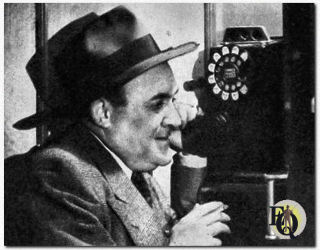 In the soap Rosemary (1945) Mr. Dennis (played by Ed Latimer) has managed to gain Susan Dawson's confidence with a story about her husband even though the fact that he swore her to secrecy should have made her more suspicious. |
| Above right: In Rosemary Ed Latimer played Mr. Dennis (1945). |
|
The Brownstone Theater (WOR-Mutual, Feb 21. - Sep 23. 1945) was a repertory theater for radio starring Jackson Beck and Gertrude Warner. Ed Latimer joined them in several episodes: "The Lion and the Mouse" (Feb 21. 1945); "The Cinderella man" (Mar 14. 1945); "Polly of the Circus" (Mar 28. 1945); "Prisoner of Zenda" (May 17. 1945); and "The Fortune Hunter" (Jun 6. 1945). The Mysterious Traveler (Mutual, Mar 31. 1945)
The Dinah Shore program was replaced on radio by
radio's version of the Topper series (NBC, Jun 7. -
Sep 13. 1945). Each episode was complete in itself and starred Roland
Young as Cosmo Topper who stumbled through his adventures under the
ectoplasmic influence of the Kerbys, those agreeable "ghosts" so well known
from fiction and films. Supporting Young, were Hope Emerson as Mrs.
Henrietta Topper, Frances Chaney and Paul Mann as the Kerbys, and Ed Latimer
as Mr. Borris. It was done far more effectively on TV.
Counter-Spy (ABC-Blue, Jun 27.
1945), In The Romance of Helen Trent, a daytime radio institution, Bugsy O'Toole (Ed Latimer) played Gil's general handyman. Bugsy is a rough but likeable person, and is very devoted to Gil (1946 - 1949). With the rough exterior and, under it, the sweetness of a child and the devotion of a man who would lay down his life for his friend the role fit Ed Latimer to perfection. |
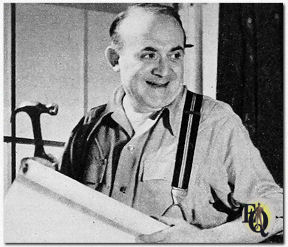 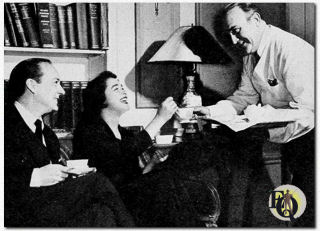 Above left: In Helen Trent, Bugsy O'Toole (Ed Latimer) as general handyman (1946). Above right: Gil (David Gothard) lives with Helen (Julie Stevens) in a charming white house in San Fernando Valley, not far from Hollywood, they're being served by Bugsy (Ed Latimer). (1949) |
|
When the casting for the popular A House in the Country was completed, it turned out that Ray Knight and Ed Latimer were to portray the 35-year-long enemies, Clarence Brown and Walter Pattison. This was the occasion for a good laugh, for those two radio veterans have been the best of friends for a decade or more. (NBC, Nov 1946 - Jan 14. 1948) The new half-hour show had been recorded for a 52-week series by the NBC Recording Division and was distributed via 1,000 audition discs among 750 radio stations and 250 advertising agencies. Ed Latimer started rewriting and selling news stories into radio mysteries. In 1947 he boasted never to have gotten a reject. He also played the smalltime gangster George Terry, on the CBS serial Young Dr. Malone (Feb 1947).
Then came the role of Sergeant Velie on radio's
The Adventures of
Ellery Queen. He took over from
Ted De Corsia sometime
between October 1946 and February 5. 1947. He is confirmed for the episode
"The Haunted House" (CBS, Feb 5. 1947) which had
Richard Coogan as
Ellery Queen, Bill
Smith as Inspector Queen and
Charlotte Keane as Nikki Porter. Quiet Please (Mutual-ABC, Nov 3. 1947 - Mar 13. 1949, min. 9 episodes) Another Broadway failure when played the role of congressman Borgsen for 7 performances in the comedy stage play The Gentlemen from Athens (Mansfield Theater, Dec 9. - 13. 1947).
Report Card (CBS, Mar 24. 1948), On TV Ed Latimer made his first appearance in a TV series in The Clock (NBC, 1949, 2 episodes), a Suspense/Anthology series based on a ABC radio series which ran from 1946 - 48.
Secret Missions (Mutual, Jun 27. 1949), |
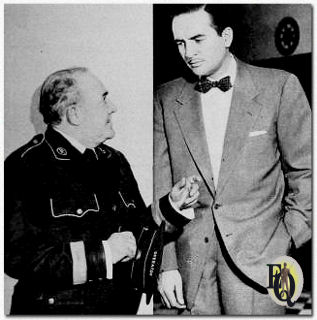 The Doctor’s Wife was a 15 minute soap, Monday thru Friday continuing series, broadcast on NBC radio during the 1950s. It featured Patricia Wheel as Julie Palmer and Donald Curtis as Dr. Dan Palmer. Ed Latimer was Frank Johnson (1953). |
| Above right: The Doctor's Wife (NBC) "Meanwhile at the hospital, Dan listens as Frank Johnson tells about his son Richard, a 'model prisoner' who is eligible for parole - if he can only get a job" |
|
In TV's The Stranger Robert Carroll played a mysterious man who helped those in distress. Ed was seen in the episode "Torpedo" (Dumont, Oct 8 1954). The last TV series appearances were in Robert Montgomery Presents (NBC, 1950 - 57): in "Dr. Ed" (aired Dec 6. 1954); as justice of the peace in the episode "A Stone for His Son" (aired Mar 14. 1955); and in the role of Trayford in "The Drifter" (aired May 23. 1955). X Minus One (NBC, May 29. 1955). Not much is known as to when exactly or how Ed passed away. In 1956 he did appear on The CBS Radio Workshop (Jul 13. 1956) and died later that year. He was buried in Hawthorne, Westchester County, New York. |
|
Notes: * For Alma, Where Do You Live? (Feb 6. 1922) he was replaced since the morning of the performance Latimer suffered an attack of pneumonia and was confined to bed. **"Sandhogs" is a term used to describe construction workers, typically employed in the building of tunnels or underground structures. They often work in hazardous conditions, such as underground or underwater, and are responsible for tasks like digging, blasting, and reinforcing tunnel walls. The term originated in the late 19th century during the construction of tunnels under rivers in New York City, where workers often encountered sandy soil. *** A report in 1941 boasted Ed played 2,327 performances of Abie's Irish Rose on the legitimate stage. This is the exact number of performances of the play on Broadway so very unlikely. According to a January 1941 article he is stated as having played supporting parts in films starring Nancy Carroll, Claudette Colbert and Maurice Chevalier. However we were unable to confirm this. All dates for movies are for the first US release. All dates for TV programs are original first airdates. All dates for (radio) plays are for the time span the actor was involved. Facts in red still need confirmation. Sentences in grey (but not in bold) are unsure for timing. |
|
Click on Uncle Sam if you think you can help out...!
|
|
Other References
Additional video & audio
sources |
|
This actor profile is a part of
Ellery Queen a website on deduction.
The actor above played Velie in the 1947
radio series of The Adventures of
Ellery Queen. Click Uncle Sam if
you think you can help out...! Many of the profiles on this site have been compiled after very careful research of various sources. Please quote and cite ethically! |
|
Page first published on March 4. 2018 Version x2.1 - Last updated April 24. 2024 |
 b
a c k
t o L i s t o f S u s p
e c t s
b
a c k
t o L i s t o f S u s p
e c t s
|
|
| Introduction | Floor Plan | Q.B.I. |
List of Suspects | Whodunit? | Q.E.D. | Kill as directed | New | Copyright Copyright © MCMXCIX-MMXXV Ellery Queen, a website on deduction. All rights reserved. |